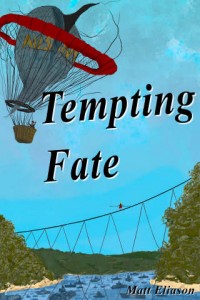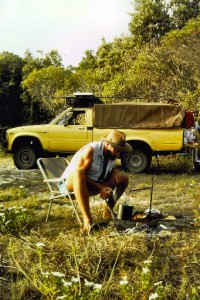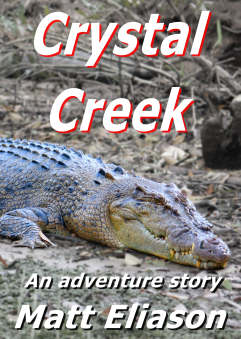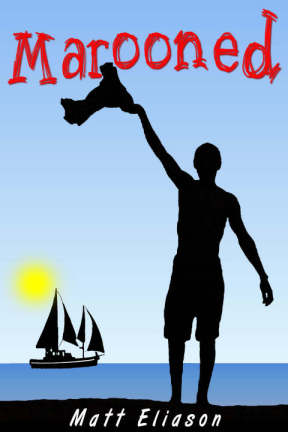
He was an entrepreneur, a thrill seeker and a man of vision.
Tempting Fate is a novel based on historical events that follows the adventures of Henry Giles during the late 1870s.
Drawing on historical records of a real life man, the fictitious Giles takes the reader through a series ever escalating high rope adventures around and on Sydney Harbour.
It is easy to imagine you are there with the characters and the bustle of the young Sydney, the sights and the sounds of busy Macquarie St, contrasted with the pleasure of the Australian bush.
Fate turns Henry’s efforts to a new form of adventure with the opportune availability of a balloon that leads him into new heights, both financial and in elevation. With every rise there is a fall, and Henry’s is spectacular.
Through it all, our hero is supported by best friend and business partner Tom and along the way he is lucky enough to meet a beautiful and smart young woman who helps Henry in unexpected ways.
43,500 words. Your support is appreciated.
Payment is via PayPal (or credit card via PayPal, see lower option on right side on screen after clicking purchase) and your download is instantly available.
Book is available in PDF and epub (for many e-readers) formats
First chapter sampler
Chapter 1 – Time for change
The crowd gasped as Henry Giles shifted balance and wobbled on the rope beneath his feet while sweat trickled down his forehead and into his eyes. All he could do was blink furiously as his hands were otherwise occupied holding the balance pole. Wearing a suit of armor, even if a lightweight copy of the original, meant performing was much more difficult. Not only because of the heat under the Sydney summer sun, but the suit’s weight affected his balance as it could not be corrected quite as quickly as when he did his other stunts dressed in more normal attire.
Inhaling, deeply he took the final dozens steps before reaching the platform where he thrust his balance pole into the cradle mounted on the tower support. Quickly slipping the pole harness from behind his neck, he pulled the stifling metal helmet from his head and cooler air swirled around his sweat-drenched face and neck, providing instant relief. Holding the helmet aloft in one hand he smiled and acknowledged the crowd as they applauded his tightrope-walking feat.
It was the last show for the day and dropped the helmet down to Tom Jackson, his business partner and friend, before he wearily descending the 40-foot ladder and with a final flourishing wave to the crowd headed towards his changing tent.
‘It was a good show,’ said Tom, a tall powerfully built man with dark curly hair compared to Henry’s shorter, more slightly built frame and tight blonde curls. ‘I did get a bit worried toward the end however, that was a big wobble you had.’
‘This damned armor is hard to perform in. We might need to modify the visor so I get more air,’ sighed Henry as they entered the tent and he headed straight to the wooden cask where he filled a tin cup with water.
‘I know you keep saying that,’ replied Tom. ‘But if you want to keep the claim to being ‘The Australian Blondin’ then you need to keep everything the same as the Frenchman used during his Australian tour. We have discussed this before.’
Tom knows this touches a nerve with Henry, whose stubborn pride would not allow him to do anything in a second-rate way. Tom was surprised, however, that the act had not been enhanced in some way before now. Henry was a man driven by ego and success and merely imitating someone else went against his nature.
Henry unfastened the leather buckles and removed the armor before tossing it into the corner and slumping into a canvas chair to ponder the best way forward. For several months he had been running his tightrope show in Sydney’s Domain Park, faithfully imitating the feats of the famous French tightrope walker, Charles Blondin. His ability to recreate all of the master’s feats, including sitting on a chair balancing just on the chair’s back legs, cooking eggs and bacon on a special charcoal brazier that balanced on its own frame on the rope, and walking with a sack on his head were so good that many had believed that Henry was in fact the real Blondin.
‘I am tiring of this show Tom. I yearn for something more challenging, and besides audience numbers are beginning to dwindle.’
‘We could catch a ship to Melbourne,’ suggested Tom as he lowered himself the only other chair. ‘There has been no-one there doing the calibre of work that you do. Most of them are just circus performers and it could be a financial boon for us and with a few months before the weather gets too cold down there we could have a decent season. Besides the city engineer has been making indications that our time here might be drawing to a close. I think he dislikes the hessian sight screens.’
Henry pondered for moment. ‘Curse him, I don’t want any of those non-paying ‘dead heads’ seeing the performance, but it might be for the best, there are too many others doing rope walking now. Tell him we will be here till the end of the month and we will pack up, that will give me sufficient reason to develop something new.’
*****
By the end of February 1877, Henry knew he had made the right decision to wind up the show. The summer heat, falling attendance numbers and the crowd’s reluctance to put their hands in their pockets for the items sold at the refreshment stands inside the enclosed area showed that the public had had their fill and a new more daring show was needed.
In addition to low attendance numbers, a testy interaction with his greatest local rival in the world of tightrope walking confirmed Henry’s conviction that he needed to something better, and fast.
It started with a knock on the door of Henry’s room at his lodgings and opening the door he saw to his surprise, his greatest competitor and self-promoter, James Elson, standing there with a self-satisfied smirk on his face.
‘Hallo James, what brings you to my door?’ asked Henry.
‘I just thought I would deliver the news of my latest feat in person, rather than have you read about it in the newspapers.’
‘Latest feat? What do you mean?’
‘Oh, I did not think you would have heard. This morning I walked a rope between two buildings, 60 feet high and a distance of 210 feet,’ boasted Elson as he stood tall and looked down his nose at Henry. ‘So I suppose this makes me the leading rope walker in the country!’
‘This morning you say?’ echoed Henry as he briefly examined his shoes to hide the shock on his face. Raising his head he looked directly at Elson. ‘Well this does come as a surprise, I had heard nothing of it.’
‘No doubt you were too busy with that little circus act in the Domain,’ retorted Elson. ‘I just thought you would like the news delivered personally, but now I must go, I have to speak to more of the press!’
Henry slammed the door on Elson’s departing figure.
‘Curse the man!’ he shouted at no one. ‘I am the Australian Blondin, how dare he…’
*
The team was coiling the tightrope and placing it into a waterproof canvas sack, rolling up the hessian screens, dismantling the towers and loading it all onto horse-drawn drays, when Henry stormed up to Tom who was supervising the work.
‘Tom,’ he called as he approached. ‘I have just had a visit from that pompous Elson who tells me he has just this morning, performed a walk between two buildings at a distance of 210 feet. How could that upstart perform such a feat right under our noses?’
‘I heard the same just a few minutes ago,’ replied Tom guardedly. He knows his friend’s ego will be severely bruised by Elson’s actions and that he will need delicate handling. ‘It’s just a setback, you know he’s no real challenge.’
‘No challenge!’ exploded Henry. ‘The upstart will be in all the papers tomorrow claiming to be a leading tightrope walker. Just because he has done one walk of any note!’
Tom saw Henry’s face had turned quite florid as a result of his angst and outburst.
‘You will think of something better,’ he said in a calming tone. ‘Why don’t you take a walk while you think on it. I’ll finish up here and see you back at the lodgings later and we can discuss our options.’
Henry looked at him and sighed. ‘Yes you are right, I am sure I will think of something,’ he said and turned and set off towards the bustling Macquarie Street. It was a place where he needed to keep his wits. The road itself, as with most others in this part of the city, was crowded with all manner of horse drawn vehicles; large four wheeled carts piled high with goods for delivery to the many businesses, the city omnibus with its four horses, hansom cabs and buckboards. Added to this are crowds of people; so many in fact that to make progress down the streets, many choose to risk their life sharing the road with the horse drawn vehicles, jumping out of the way as required, careful not to jump into the path of another coming up from behind. Every day the papers reported injuries and death from accidents on the roads.
He headed down the hill towards the harbour and Circular Quay. This part of the city fascinated him and today was no different, with the water busy with ferries and other watercraft departing and arriving. Wandering around the curved sandstone wall on the foreshore that gave the quay its name he arrived at the eastern wharf where several ships were tied alongside. The place was a hive of activity as stores were unloaded from the ship’s cargo holds. He watched nets holding the cargo being lifted from the holds and swung out on booms and gently deposited on the wharf. The cargo was set upon by teams of workers who soon loaded it onto waiting drays.
Gazing up at the forest of masts he watched a sailor make his way along one of the spars, loosening the sails to allow them to dry while the ship was at anchor. He saw that while the sailor gripped the lashings on the spar, half leaning over it for support, his feet shuffled sideways along a rope that ran under the spar for its entire length. Watching the sailor as he worked, he looked from one ship to the other and back again; Henry had an epiphany. Almost speechless with excitement he hurried back up Macquarie Street dodging traffic and people and entered the Domain just in time to find Tom who was just leaving.
‘Tom, I have an idea!’ panted Henry, blustering with excitement. His face was drenched with sweat and his curly blonde hair glistened and he even had sweat on the ends of his waxed mustache. ‘It is something that I am sure Blondin himself would approve and put that Elson back in his place.’
Tom looked at him with a look of expectation mixed with carefully hidden amusement. He doubted Henry had exposed himself to this much exertion for a long while. ‘Go on.’
‘I was down at the harbour and was looking at the ships tied up at the wharf. I watched a sailor moving about high up, shuffling his feet along ropes slung under the spars. That’s when I had my idea!
‘Those ship’s masts are twice the height above the water than we can achieve with towers on land or in fact probably any building in Sydney. What if I could convince two captains to anchor their ships a distance apart and allow us to stretch a rope between the tops of the masts of each ship!’ Henry exclaimed.
Tom rubbed his chin deep in thought, as he looked towards the harbour at the tops of some ships masts just visible in the distance. ‘I could work I suppose,’ he said slowly. ‘I think stopping the ships moving and getting the tension right will be the hard part, but yes, it would be worth conducting some investigations.’
Chest swelling with anticipation and despite being a good six inches shorter, Henry reached up and slapped Tom on the back. ‘Righto! You get this lot stored away and I will go and visit the Port Office to see when a couple of ships will be tied up long enough to give us time to set up and get a few days of shows in before they have to sail!’
*
A week later and dressed to impress in fine breeches, a linen shirt with a stiff high collar and light coloured tie, they strode along the wharf. Tom, despite is longer legs, had to walk fast to keep up with his slightly built friend. Henry grasped a sheet of paper provided to him by the clerk of the Ports Office, with the names of the two newly arrived ships and their captains.
Reaching the bow of the first he read the name of the ship, Jane Woodburn, the first name on his list. Reaching a gangway, he consulted his paper again before hailing a person on deck who appeared in charge.
‘I wish to enquire if Captain Saunders is available,’ called Henry.
The man turned and ran his eye over Henry and without the slightest flicker of emotion said in a thick English West Country dialect, ‘Who might be doing the enquirin’,’
‘I am the Australian Blondin and I have business to discuss with the captain.’
A flicker of mirth crossed the man’s face. ‘Well if you wait ‘ere I’ll see if the Capin’ is available,’ and he trudged towards the stern of the ship before stooping to enter a low doorway.
‘What do you think Tom?’ said Henry with excitement. ‘These masts must be 100 feet tall at the top gallants, perfect I’d say!’
Tom craned his neck ‘Yes they have the height, this idea might have merit.’ Deep down his stomach churned. He had a great fear of heights and it was his job to get the walking rope tied off at each end. While the height of the masts excited Henry, the prospect of going so high filled him with dread.
Movement on the deck caught their attention and Henry clapped his hands together and rubbed his palms in anticipation as a tall, bearded, middle-aged man dressed in a long blue coat and shiny brass buttons studied them as he approached the gangway.
‘I am Captain Saunders. Please come aboard, just mind your step as to come off the gangway.’
Henry fairly leaped up the sloping board while Tom, without the athletic prowess of his friend, made his way more cautiously, making use of the strung rope handrails.
‘Very good of you to see me Captain, my name is Henry Giles, known here in New South Wales as the Australian Blondin and this is my business partner Tom Jackson,’ announced Henry as they followed the captain across the deck, stepping over rope and around various items of ship related equipment.
‘Blondin you say.’ You might like to share with me what a blondin actually is,’ said the captain as he showed them into his cabin and ushered them into two thinly padded chairs across from his desk.
Henry took in the cabin quickly. It was by no means spacious; their chairs were so close that Tom’s knees almost touched the desk. One wall had several windows that afforded a view out of the stern, while another had a curtain across it, the captain’s sleeping quarters no doubt. Behind the captain the wall had a mixture of drawers and cupboards.
‘There was a Frenchman called Blondin who was a famous tight rope walker, ‘ explained Henry. ‘I have a tightrope act that does everything he does, except of course, walking across Niagara Gorge as he has done. Hence I have this stage name. I have had an act here in Sydney for some months and am seeking a new challenge.’
Henry sat back and paused while he twisted a pointed tip of his waxed mustache before continuing. ‘My idea, sir, is to walk a rope set between the topgallants of two ships. I believe your ship will be docked for the next week which would allow time to set the rope, arrange publicity and have time to do a few performances before you need to set sail. What do you think?’
‘Well, it is a novel idea,’ replied Saunders slowly. ‘What makes you think people would come?’
‘My current act sees me 40 feet above the ground, this is the limit we can successfully stay the end posts and maintain sufficient tension on the rope. By using your mast and that of a second ship as the end posts, the height alone and the risk of my doom should I fall will be enough to see people wanting to watch the spectacle. The height of your top gallants, these would be close to 100 feet would they not?’
Saunders nodded. ‘The yard for the top gallant sail is 95 feet above the deck, so yes I am sure that a fall from that height, assuming you did not hit the lower yards on the way down, would certainly seal your downfall and give your audience their money’s worth,’ replied Saunders with a chuckle at his small slice of humour.
‘I might be willing,’ he continued ‘depending on what was in it for me and of course you will need the agreement of another ship.’
Henry outlined his plan to gain a financial return for the effort. As there was no way he could block the view from land or water due to the height, his idea was to anchor the two ships in the middle of the harbour, a distance away from the main population areas. Each ship would need to lay out four anchors, two having a winch to enable adjustments to be made to counter any movement of the tide.
The ships would be far enough from shore that onlookers might see a small figure at best, so spectators would need to buy tickets on chartered ferries where refreshments would also be sold. Premium tickets would allow spectators onto each of the two ships acting as securing points and the money for these premium tickets and for any refreshments the captains provided, would go directly to the captain of each vessel.
‘Very well,’ responded Saunders. ‘I’m willing if you can find another vessel. Bear in mind that we would lay out the anchors after we are loaded and are ready for sea. The spectators will need to be ferried to our ship and returned after your performance, as we cannot re-dock once we have left our berth. Let us say I can be ready in five days time and can offer you two days at anchor in the harbour, will that suit your purposes?’
‘It will indeed!’ cried Henry as he leapt to his feet and offered his hand to the captain. ‘I will arrange a second ship and advise you further so you can make anchoring arrangements with her captain.’
Later that afternoon as they made their way back to their lodgings Henry was bursting with excitement at having secured the second ship, the Loch Maree.
‘By God Tom, this will really put the act on the map. Can you see to it that the walking rope will be long enough, 500 feet should be ample. I will see about chartering some ferries and talk to the Gazette, Herald and the Mail about some publicity and arrange some fliers.’
*
Four days later Henry had reserved 12 ferries each able to carry between 100 and 200 passengers. Tickets at for six shillings a head were to be sold at the dock on the morning of the walk and a team of workers had been employed to sell refreshments on the ferries at highly profitable prices. Premium tickets were to be sold at ten pounds per head, including a sit-down lunch aboard each vessel with the captain, the captain getting nine pounds and Henry and Tom keeping the rest to cover transport costs of passengers, plus a small profit.
The event was promoted in each of the city’s newspapers via advertisements therein:
Australian Blondin
(H. Giles)
To perform a death defying feat
100 feet above the harbour
Walking tightrope between
Two tall masted vessels
Saturday and Sunday
17 & 18 March 1877
Everything was set…
Payment is via PayPal (or credit card via PayPal) and your download is instantly available.
Book is available in PDF and epub (for many e-readers) formats
 This is another 500 word story I submitted to ABC Open for their 500 words: Endings project. They say what goes around comes around.
This is another 500 word story I submitted to ABC Open for their 500 words: Endings project. They say what goes around comes around.



